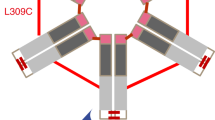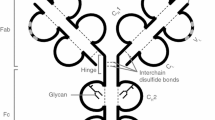Abstract
IgG antibodies have long been recognized as proinflammatory mediators of the humoral immune response. Antibodies bind and neutralize antigens to promote antibody-dependent cytotoxicity, opsonization of antigens, and the initiation of phagocytosis. Whereas the antigen specificity of antibodies is determined by the antigen-binding Fab portion, the effector functions initiated by antibodies are triggered by the Fc (crystallizable) domain. These effector functions are heavily dependent on the single N-linked, biantennary glycan of the heavy chain, which resides just below the hinge region. This glycan is believed to maintain the two heavy chains of the Fc in an open confirmation required for interactions with activating Fcγ receptors (FcγRs). However, the presence of specific sugar moieties on the glycan has profound implications on Fc effector functions. The addition of terminal sialic acid to the glycan reduces FcγR binding and converts IgG antibodies to anti-inflammatory mediators through the acquisition of novel binding activities. Studies from our laboratory demonstrated that these sialylated IgG Fcs are important for the in vivo activity of intravenous immunoglobulin. Instead of binding with FcγRs, sialylated Fcs initiate an anti-inflammatory cascade through the lectin receptor SIGN-R1 or DC-SIGN. This leads to upregulated surface expression of the inhibitory FcR, FcγRIIb, on inflammatory cells, thereby attenuating autoantibody-initiated inflammation.


Similar content being viewed by others
References
Nimmerjahn F, Ravetch JV. The antiinflammatory activity of IgG: the intravenous IgG paradox. J Exp Med. 2007;204:11–5.
Nimmerjahn F, Ravetch JV. Anti-inflammatory actions of intravenous immunoglobulin. Annu Rev Immunol. 2008;26:513–33.
Debré M, Bonnet MC, Fridman WH, Carosella E, Philippe N, Reinert P, et al. Infusion of Fc gamma fragments for treatment of children with acute immune thrombocytopenic purpura. Lancet. 1993;342:945–9.
Monach PA, Mathis D, Benoist C. The K/B×N arthritis model. Curr Protoc Immunol. 2008;15:22.
Samuelsson A, Towers TL, Ravetch JV. Anti-inflammatory activity of IVIG mediated through the inhibitory Fc receptor. Science. 2001;291:484–6.
Kaneko Y, Nimmerjahn F, Madaio MP, Ravetch JV. Pathology and protection in nephrotoxic nephritis is determined by selective engagement of specific Fc receptors. J Exp Med. 2006;203:789–97.
Clynes R, Ravetch JV. Cytotoxic antibodies trigger inflammation through Fc receptors. Immunity. 1995;3:21–6.
Nimmerjahn F, Ravetch JV. Divergent immunoglobulin g subclass activity through selective Fc receptor binding. Science. 2005;310:1510–2.
Nimmerjahn F, Ravetch JV. Fcgamma receptors as regulators of immune responses. Nat Rev Immunol. 2008;8:34–47.
Bolland S, Yim YS, Tus K, Wakeland EK, Ravetch JV. Genetic modifiers of systemic lupus erythematosus in FcgammaRIIB(−/−) mice. J Exp Med. 2002;195:1167–74.
Yuasa T, Kubo S, Yoshino T, Ujike A, Matsumura K, Ono M, et al. Deletion of fcgamma receptor IIB renders H-2(b) mice susceptible to collagen-induced arthritis. J Exp Med. 1999;189:187–94.
Bruhns P, Samuelsson A, Pollard JW, Ravetch JV. Colony-stimulating factor-1 dependent macrophages are responsible for IVIG protection in antibody-induced autoimmune disease. Immunity. 2003;18:573–81.
Crow AR, Song S, Freedman J, Helgason CD, Humphries RK, Siminovitch KA, et al. IVIg-mediated amelioration of murine ITP via FcgammaRIIB is independent of SHIP1, SHP-1, and Btk activity. Blood. 2003;102:558–60.
Tackenberg B, Jelcic I, Baerenwaldt A, Oertel WH, Sommer N, Nimmerjahn F, et al. Impaired inhibitory Fcgamma receptor IIB expression on B cells in chronic inflammatory demyelinating polyneuropathy. Proc Natl Acad Sci U S A. 2009;106:4788–92.
Arnold JN, Wormald MR, Sim RB, Rudd PM, Dwek RA. The impact of glycosylation on the biological function and structure of human immunoglobulins. Annu Rev Immunol. 2007;25:21–50.
Kaneko Y, Nimmerjahn F, Ravetch JV. Anti-inflammatory activity of immunoglobulin G resulting from Fc sialylation. Science. 2006;313:670–3.
Anthony RM, Nimmerjahn F, Ashline DJ, Reinhold VN, Paulson JC, Ravetch JV. Recapitulation of IVIG anti-inflammatory activity with a recombinant IgG Fc. Science. 2008;320:373–6.
Hansen RJ, Balthasar JP. Intravenous immunoglobulin mediates an increase in anti-platelet antibody clearance via the FcRn receptor. Thromb Haemost. 2002;88:898–9.
Clynes R. Protective mechanisms of IVIG. Curr Opin Immunol. 2007;19:646–51.
Ravetch JV, Bolland S. IgG Fc receptors. Annu Rev Immunol. 2001;19:275–90.
Anthony RM, Wermeling F, Karlsson MC, Ravetch JV. Identification of a receptor required for the anti-inflammatory activity of IVIG. Proc Natl Acad Sci U S A. 2008;105:19571–8.
Acknowledgments
Jeffrey V. Ravetch is supported by grants from the NIH and Virdante Pharmaceuticals. Robert M. Anthony is a fellow of the Irvington Institute of the Cancer Research Institute.
Conflict of Interest
Jeffrey V. Ravetch has a financial interest in Virdante Pharmaceuticals. Robert M. Anthony has no conflict of interest.
Author information
Authors and Affiliations
Corresponding author
Rights and permissions
About this article
Cite this article
Anthony, R.M., Ravetch, J.V. A Novel Role for the IgG Fc Glycan: The Anti-inflammatory Activity of Sialylated IgG Fcs. J Clin Immunol 30 (Suppl 1), 9–14 (2010). https://doi.org/10.1007/s10875-010-9405-6
Published:
Issue Date:
DOI: https://doi.org/10.1007/s10875-010-9405-6




